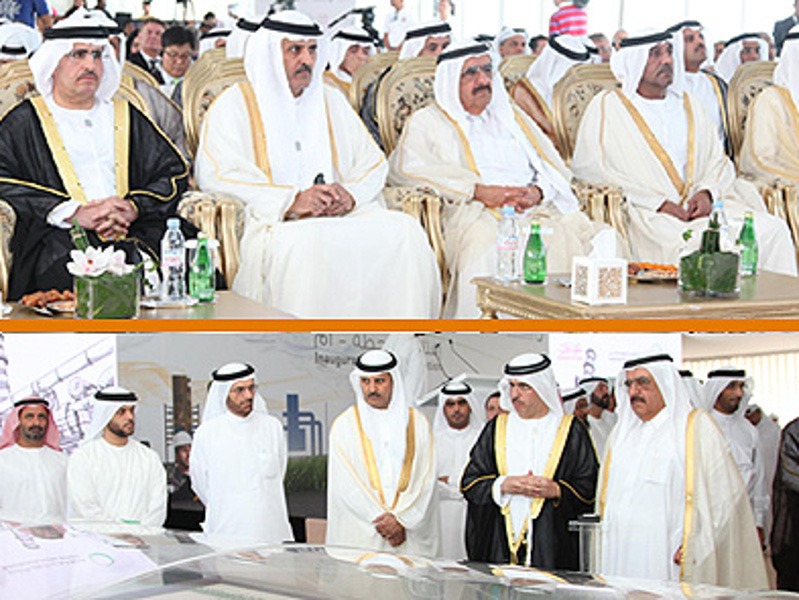Jebel Ali M-Station, located within the Jebel Ali Power Plant and Desalination Complex, Dubai, UAE, is undergoing an AED1.47bn ($400m) expansion to add 700MW combined-cycle generation capacity.
The existing Jebel Ali M-Station, with 2,185MW of installed power generation capacity and 140 million imperial gallons of water per day (MIGD) desalination capacity, is the UAE’s biggest power production and desalination facility.
Brought into operation in 2013, the integrated power and desalination facility was developed with an estimated investment of AED10.15bn ($2.7bn) by its owner and operator Dubai Electricity & Water Authority (DEWA). The power facility and the desalination plant were estimated to have cost $1.69bn and $1.01bn, respectively.
The current installed capacity of the M-Station is sufficient to power approximately one million homes in Dubai.
Project Gallery
-

The Jebel Ali M-Station is the UAE’s biggest power and desalination facility. Image courtesy of Dubai Electricity and Water Authority.
-

The M-Station expansion project will add 700MW installed capacity. Image courtesy of Dubai Electricity and Water Authority.
-

The Jebel Ali M-Station was inaugurated in 2013. Image courtesy of Dubai Electricity and Water Authority.
Jebel Ali M-Station expansion details
DEWA awarded the key contracts for the 700MW M-Station expansion project in the first quarter of 2015.
The expansion project involves the addition of two dual-fuel gas turbine generators, two heat-recovery steam boilers, and a 90% fuel-efficient steam turbine from Siemens. The project is expected to increase the thermal efficiency of the M-Station from 82.4% to 85.8%.
DEWA has started testing the new turbines and the M-Station expansion project was 98% complete as of February 2019.
The new facility is expected to be commissioned in the first half of 2019. It will increase the M-Station’s installed capacity to 2,885MW and DEWA’s total power generation capacity to 11.6MW.
Jebel Ali M-Station power and desalination facility make-up
The existing M-Station power plant is equipped with six Siemens SGT5-4000F gas turbines, six SGen5-1000A series generators, six boilers for waste heat recovery, and three 218MW steam turbines.
Each gas turbine of the plant has a rated power of 255MW and is fitted with dry-low NO2 combustion chambers for dual fuel operations. Natural gas is used as primary fuel and diesel oil as back-up.
The desalination plant uses eight 17.5MIGD desalination units equipped with Multi Stage Flash (MSF) distillation technology. The distillation facility also houses two dual fuel-fired auxiliary boilers and 16 fuel-oil storage tanks of 20,000m³ capacity each.
Contractors and suppliers
Siemens bagged the contract to supply major equipment for the M-Station expansion project in February 2015.
Mott MacDonald was appointed as the project consultant for the M-Station expansion in the same year.
Fisia Italimpianti, Gruppo Impregilo, and Doosan Heavy Industries were engaged as the general contractors for the original M-Station power and desalination plant commissioned in 2013.
Fichtner served as the project consultant and was involved in the construction of the 400kV switchyard for the project.
Siemens provided the gas turbines, while Alstom supplied three 218MW COMAX steam turbines and TOPAIR air-cooled turbo-generators under a €60m ($68m) contract.
Korea Electrical Contractors Association was the electrical contractor for the project. Hyosung Power & Industrial Systems provided 16 high-voltage motors for the station, while Process Group International supplies filter vessels and gas metering skids for the M-Station power and desalination facility.
Cortec provided its patented MCI technology to provide corrosion protection for the reinforcing metal in the concrete structure. Cana Oil & Gas Services and Construction Company were engaged for the painting of the structures and equipment.
Torishima supplied the brine recirculation pump, while Kubota supplied a double--suction volute pump. Inco fabricated eight units of cladded piping for the desalination plant.
Idiotic was engaged for the meteomarine and morphological studies, including the final design of marine works for sea water outfall and slipway.
Sejong Corporation and Lianyungang Zhongfu Lianzhong Composites Group were among the other contractors involved with the integrated power and desalination facility.
